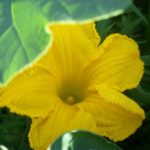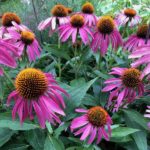
Calendula Officinalis
The mindfulness word for the week is constancy, inspired by Calendula flowers overflowing in my yard. We’ll get to the “constancy” part of the plant in a moment, but first here is a little bit of information about this healing plant.
About the Herb
Calendula (Calendula officinalis), sometimes called pot marigold, is an easy to grow flower and medicinal herb. It grows as an annual in most zones (every zone other than 8-10), and it easily re-seeds. Petals range from yellow to orange. The flowers will bloom most of the summer if the faded flowers are picked.
The flowers are edible and look beautiful added to scrambled tofu, salads, and sandwiches. The petals can even be added to popsicles or ice cubes for an interesting touch.
The plant has a long history as a healing herb. It is known to have anti-inflammatory properties and tea can be made from the fresh or dried flowers. It also has soothing and healing properties for the skin. My favorite use for Calendula is salve that can be used on cuts, bruises, rashes, and burns, and is gentle enough for babies. I make a simple salve by combining dried flowers with olive oil and gently warming. (Don’t boil them!) This infuses the oil with the healing properties. After straining the flowers the oil can be used as it is. But to move to the next step and make a salve, warm the oil again and slowly add bits of beeswax. You’ll need about 1 part beeswax to 4 parts oil. Let it cool and you’ll have your own hand crafted salve.
The Constancy part of Calendula
The Romans named the plant after the Latin word calends, which means first day of the month. According to the Rodale’s Illustrated Encyclopedia of Herbs , the Romans observed the plant flowering on the first day of every month throughout the entire year (that doesn’t happen in Denver). And they named the plant accordingly. For the Romans there was a constancy and dependability to the plant flowering. Constancy implies a reassuring quality in which we are fairly sure that something will take place. Of course, nothing on the planet is completely dependable. But there are many things – people, animals, plants, and events, that invoke the idea of constancy in our lives. They are probably the things we sometimes take for granted. This week we can be mindful of the constants in our lives, just taking note of them and their reassuring attributes.
For more information on mindfulness focus words click here.



